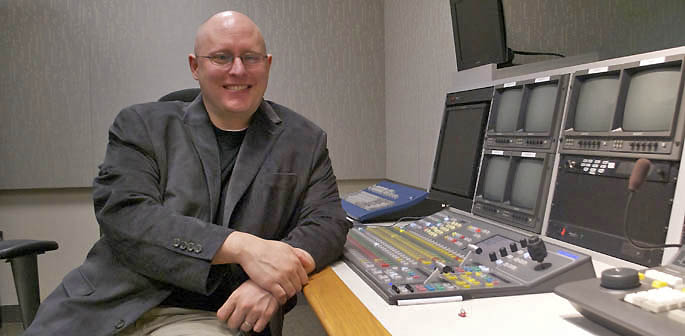Meet Thom Baggerman, assistant professor of broadcast journalism Friday, March 23, 2012

Thom Baggerman, Ph.D., came to Point Park from Capital University, where he was an assistant professor in the Department of Communication. He was also previously a visiting instructor at the University of Pittsburgh and a part-time faculty member at Robert Morris University. Baggerman has worked at various television stations, including WTOV-TV, where he was operations manager and director/producer/production technician, and WGGB-TV, where he was director/producer.
Why did you choose to teach at Point Park?
There are many things that brought me to Point Park, not least among them the fantastic experience of being Downtown! I really like the commitment to small class sizes and the practical "applied theory" nature of many of the courses in broadcasting, journalism and multimedia. I've always believed in programs that blend traditional learning with lots of doing. Finally, I am very excited to have the opportunity to work with both undergraduate and graduate students.
What are some of the classes you teach?
- Advanced Television Production
- Broadcast Copywriting
- Introduction to Multimedia
- Mass Media History / Mass Communication History
- Survey of Mass Communication
- Video Production & Editing I
How would you describe your teaching style?
I believe that blending theory and application is vital, so my classes usually follow a cycle of short lecture/discussion/activity. There may be two or three of these cycles in one meeting depending on the class. Ultimately, I try to challenge the students to solve problems using the knowledge presented through readings, lectures and discussions.
How do you incorporate your professional experience into the classes you teach?
My experience in broadcast production and broadcast management inform all aspects of my teaching, from preparation to delivery. I keep up with developments in the industry and bring that new information into my courses. The activities and projects that I use are common ones that students will encounter in their professional lives, giving them practice for what they'll have to do later.
What advice do you have for prospective students considering a career in the broadcasting industry, specifically in production and programming?
Broadcasting is a field constantly in flux - changes are the rule, rather than the exception, at an increasing rate. Students should learn as much as they can and DO as much as they can while they're in school to prepare for entry into such an exciting environment. My best piece of advice: During the first week of your first year, get involved with at least two organizations that do what you want to do so you can start building your resume and demo reel!
Photo by Leah Irwin, photojournalism major

